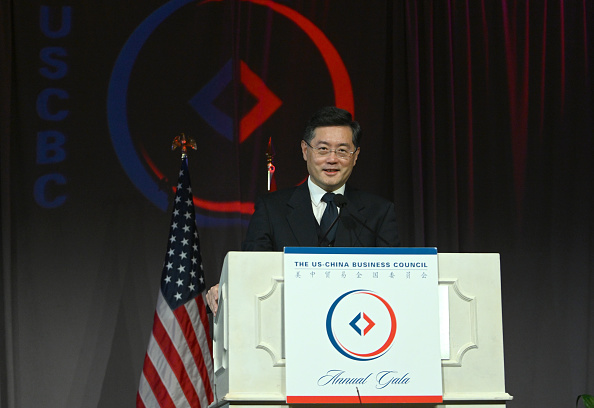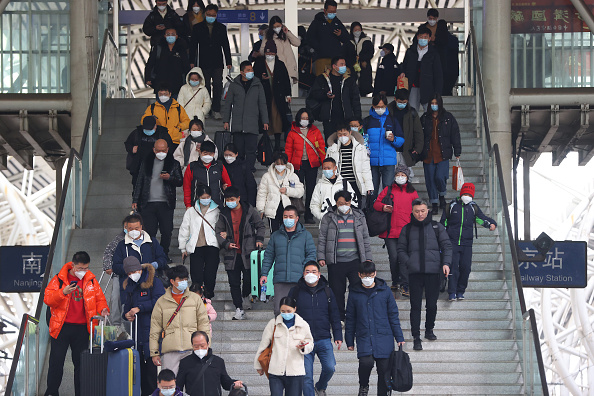
 Common Challenges
Common ChallengesChina has named Qin Gang, formerly the ambassador to the United States, as the country's new foreign minister. After Qin was promoted to the powerful Central Committee at the ruling Communist Party's national congress in October, many suspected this promotion was in the cards.
Known as one of the toughest voices within the foreign ministry, Qin began his ambassadorship in the United States in July 2021 during a tumultuous time in U.S.-China relations. Throughout his time in Washington, Qin has defended China's position on thorny bilateral issues, such as Taiwan and human rights.
Qin said he was "deeply impressed" by the American people, despite it being "a time of severe challenges for U.S.-China relations." He pledged to continue to push forward the relationship between the two world powers in his new role.
In solving common challenges, China's diplomacy will offer "Chinese wisdom, Chinese initiatives and Chinese strength," Qin said in his first statement as foreign minister.
Despite the numerous tensions in the relationship, China-U.S. ties have improved since President Joe Biden and Chinese leader Xi Jinping met in November at the G20. Secretary of State Antony Blinken is also expected to visit China in the coming months, signaling a further thaw in the relationship.
In an op-ed published before he departed, the Ambassador wrote about the U.S. being a country different to the one he experienced in Washington D.C., writing that the high degree of economic interdependence between the two countries should serve as a reminder that decoupling serves no one's interest.
 A New Phase
A New PhaseChina is experiencing a surge in COVID-19 infections after loosening its zero-COVID strategy over a month ago. While the country claims just 22 COVID deaths since December by using its own criteria to measure fatalities, the World Health Organisation is warning that China is drastically underrepresenting the number of people dying from the respiratory virus.
Some reports indicate that half or even three quarters of the labor force is infected and not able to work, leading to many factories slowing production and unable to complete orders. This is building on a collapse in demand from U.S. buyers, with manufacturing orders from China already down 40%.
In his New Year's address to the nation, President Xi Jinping said that China is following a science-based and targeted approach, and has adapted its COVID response to protect the life and health of the people to the greatest extent possible.
"We have now entered a new phase of COVID response where tough challenges remain," he said
Outbound Chinese travel has increased dramatically, as affluent travelers seek a refuge from the wave of infections. Yet, more than a dozen nations have introduced travel restrictions on travelers from China. Beijing has criticized these as politically motivated and threatened retaliation.
As China enters its Lunar New Year holiday, the countryside is expecting an uptick in infections as millions of migrant workers return to their homes for the celebration. The travel period, which will span the next 40 days, is likely to strain the rural health care system only weeks after hospitals in wealthy cities like Beijing and Shanghai faced their own surges.
Read more in "2023 Outlook: Economy on Track," by Xu Hongcai, Deputy Director of the Economic Policy Commission.
 Avoiding Conflict
Avoiding ConflictWhile tensions between the U.S and China over the sovereignty of Taiwan have continued to increase, national security adviser Jake Sullivan recently stated that a potential military conflict can and should be avoided.
"There is a risk of conflict with respect to Taiwan, but I believe that with responsible stewardship, we can ensure that this contingency never comes to pass. And that is our responsibility," he said. He also acknowledged that achieving this objective will require "hard work" and "coordination with allies."
Sullivan's comments also followed a new defense spending bill that strengthens military cooperation, adopted by Washington at the end of December, that was met with strong criticism from Beijing. Following the bill, China sent 71 warplanes and seven warships into waters near Taiwan, the largest Chinese military incursion in months.
Additionally, the U.S. announced they will be sending a delegation of trade and economic officials to Taiwan next week, adding to tensions, as Beijing is strictly opposed to a trade initiative between Taipei and Washington. According to the USTR, the talks will focus on a range of issues, including agricultural and digital trade, the role of state-owned enterprises and labor, environmental and anti-corruption standards. Further rounds of talks will likely follow next week's negotiations as well.
Prepared by China-US Focus editorial teams in Hong Kong and New York, this weekly newsletter offers you snap shots of latest trends and developments emerging from China every week, while adding a dose of historical perspective.
- 2022-12-23
- 2022-12-16 All in On Africa
- 2022-12-09 Seeking Stabilization
- 2022-12-02 Turf Tension
- 2022-11-18 Thawing Ties?
- 2022-11-11 Face to Face
- 2022-11-04 The Pacing Challenge
- 2022-10-28 Third Time’s the Charm
- 2022-10-21 United as Steel
- 2022-10-14 Party Time
- 2022-10-07 Elections Incoming
- 2022-09-30 Hot Intrigue
- 2022-09-23 Global Gridlock
- 2022-09-16 Injecting Stability
- 2022-09-09 Cutting Edges
- 2022-09-01 A Win for Global Business
- 2022-08-26 A Heavy Price
- 2022-08-19 Risky Business
- 2022-08-12 Backtracking
